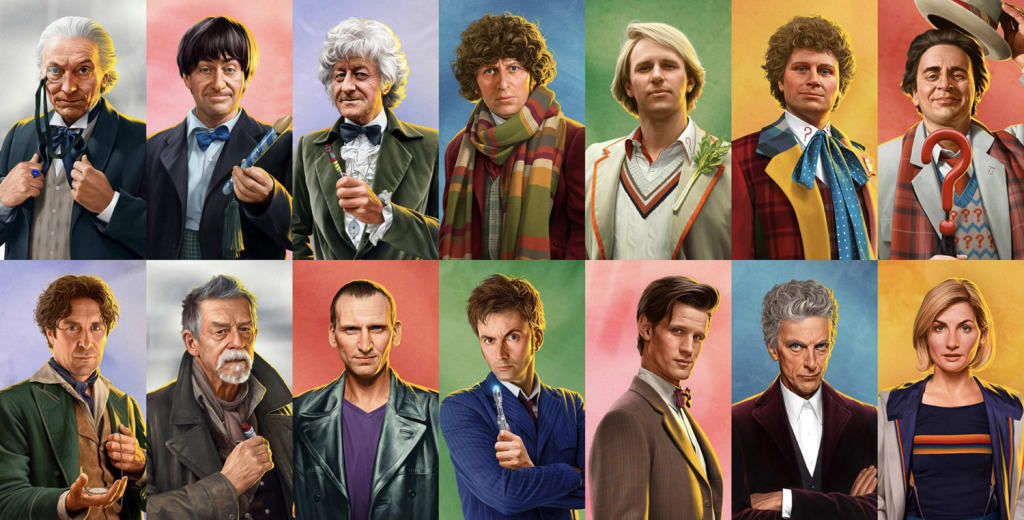
Doctor Who ended in 1989 after 26 years of onscreen adventures. Doctor Who returned to television in 2005 to become more popular than ever worldwide. Both of the preceding statements are accurate, but neither comes close to telling the whole story. Even considered collectively, they leave major gaps in the narrative and can raise many questions in even the simplest conversations between fans.
None of these gaps raises quite so many questions as the one that happens to be the size and shape of acclaimed character actor Paul McGann. Was he “the George Lazenby of Doctor Who”, starring in just a single uneven TV movie in 1996? Alternatively, was his incarnation the first truly multi-media Doctor carrying on in spin-off media even after the 2005 relaunch before taking his belated victory lap on TV in 2013? To some extent the answer to each question is yes, but neither interpretation adequately communicates the mix of frustration and promise that characterized the program’s “Wilderness Years”. For a period defined by a lack of new Doctor Who on television, the era's influence on both the ongoing narrative and fandom remains astonishing.
Between the final episode of Survival in 1989 and the 2005 premiere of Rose, no less than four earnest efforts at continuing Doctor Who emerged in various mediums. Along with the McGann movie, the New Adventures novels, Big Finish Productions’ range of audio-dramas (many of them starring Paul McGann) and the 2003 animated serial The Scream of the Shalka all endeavored to expand upon the 26 seasons of history that preceded them. Though many of these stories overtly appealed to existing fans, each of them demonstrated the same potential to be someone’s gateway to loving Doctor Who as any of its pre-1990 installments. To some degree they all proved influential on the series’ onscreen resurrection, which is very telling about how it differs from other long-running space-fantasy series.
Like Doctor Who, Star Wars pursued numerous continuations beyond its core storyline, nearly all of them treated with some degree of narrative legitimacy even as the movies reigned supreme. Nevertheless, when the time came to relaunch the saga's cinematic mothership, those narratives were largely cast aside (in continuity terms, if not commercially) to make way for the new films and a new history within them. Doctor Who for its part has studiously avoided declarations about what counts as "real", embracing - or at least shaking hands with - nearly everything even when it means accepting a multitude of contradictions.
Herein lies the agony and ecstasy of Doctor Who fandom. In theory, the program's open-ended approach to canon (as opposed to continuity) means there's much more to unite fans than divide them. However, in practice it serves more as a battlefield that turns fandom into fiefdoms. It's not just that we can barely agree on the fundamentals of Doctor Who's existence, we can barely agree on how to talk about them.
For a series that so often celebrates the virtues of language, it's ironic that fandom at large has embraced divisive terms to describe it. The run of stories produced by the BBC from 1963 to 1989 is widely referred to as the "Classic Series" while the iteration that started airing in 2005 is frequently called "NuWho". The prevalence of these expressions obscures the extent to which neither is especially accurate.
"Classic Series" and its variants are arguably the worst. However much one enjoys the tenure of Jon Pertwee or Peter Davison as the Doctor, the word "classic" sits uncomfortably in any objective assessment of The Mutants or Arc of Infinity. Even if Patrick Troughton or Sylvester McCoy is "your Doctor", the implication that stories like The Dominators or Silver Nemesis are inherently superior to every "NuWho" episode is dubious at best. "NuWho" at least flirts with relevance, but after going from Christopher Eccleston to Jodie Whittaker (with a fantastic detour involving John Hurt), the label feels equal parts anachronistic and antagonistic. It isn't designed to describe - only to divide.
Perhaps the “Wilderness Years” are to blame. The period when Doctor Who wasn’t a going concern on television sparked a great deal of creativity, much of it from individuals who helped shepherd it back to onscreen prominence. At the same time, even that term is ripe for conflict, too often used to imply that those who remained devoted to Doctor Who between its two epochs of televised success somehow earned their fandom more than those who engaged more casually.
What's lost in the verbal battle for supremacy is that the only requirement for being a "real fan" of Doctor Who is enjoying Doctor Who. Terms like "the Cartmel Masterplan" and “the UNIT dating controversy” can be a useful shorthand when engaging with fellow fans, but the minute they become a gatekeeping mechanism their value is as compromised as the Thal dome in Part Three of Genesis of the Daleks (sorry, very compromised).
That's not to suggest that fans should agree on everything, except perhaps agreeing that the "not my Doctor" crowd are an embarrassment. People should enjoy what they want regardless of its supposed stature. Nearly every Doctor Who fan has at least two stories where their own feelings put them at odds with fandom at large, and that's as it should be. Colin Baker’s debut story as the Doctor, The Twin Dilemma, is frequently ranked as the worst TV story in the program’s entire history, while The Talons Of Weng-Chiang is generally viewed as a high point of Tom Baker’s long tenure in the role. Nevertheless Colin Baker’s mercurial performance in the former or the racially insensitive elements that permeate the latter could turn the consensus opinions on their heads for any given fan.
The Doctor Who universe - at least in its earthly manifestation - is a better place when fans can find the good buried in the dubious while being honest about the flaws in even the most beloved story. It’s more satisfying when we respect the fact that even the least favorite stories represents a sincere effort on the part of hundreds of people to entertain millions. Thanks to social media and conventions, sometimes those people are our friends too.
Like any long-running program, Doctor Who certainly deserves a kicking from time to time, but we shouldn't kick our friends. And we shouldn't kick anyone else either. Rather than shouting at other people about whether Paul McGann counts as a “Classic Doctor” (aren’t all of them “classic” in their own way) or how [Insert name of producer/writer/actor] destroyed the show (if late-80s BBC apathy couldn’t do it, no individual can), why not just talk about Doctor Who?






Comments
There are no comments for this story
Be the first to respond and start the conversation.